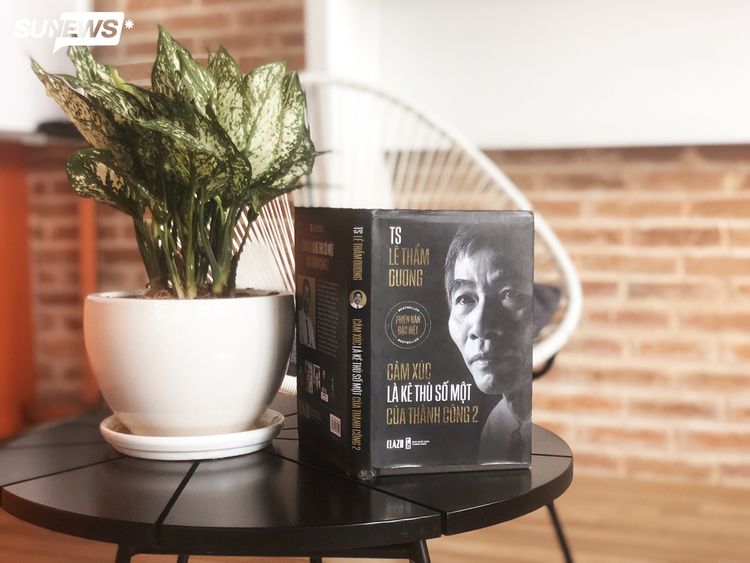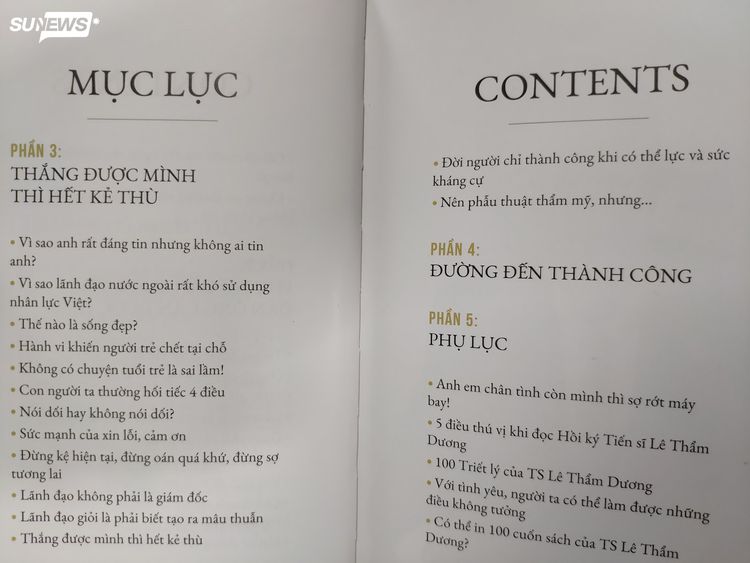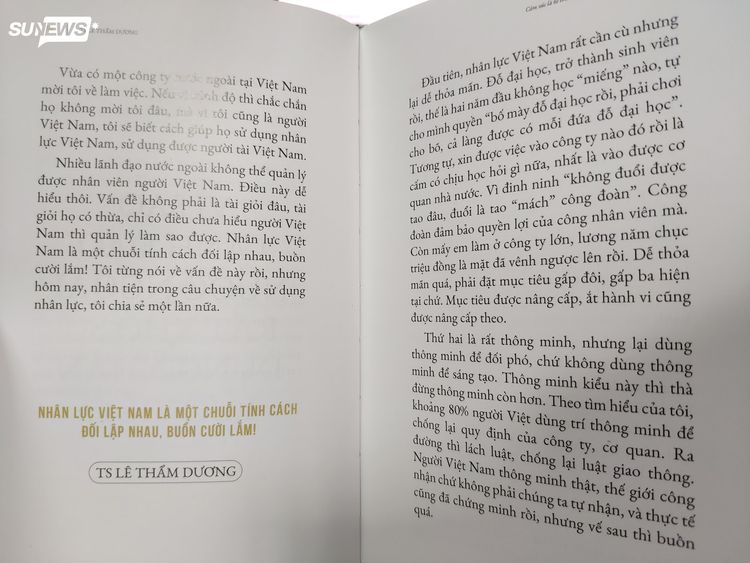[Review] Cảm xúc không có lỗi, lỗi tại anh đã biến nó trở thành kẻ thù 'không đội trời chung' của thành công
Nếu bạn muốn đọc một cuốn sách truyền cảm hứng hay phát triển bản thân bằng những mẩu chuyện suy ngẫm thì đây không phải là lựa chọn lý tưởng. Nhưng nếu bạn muốn quản trị cảm xúc của mình tốt hơn và không biến nó thành kẻ thù của thành công thì hãy tìm đọc "Cảm Xúc Là Kẻ Thù Số Một Của Thành Công" của TS Lê Thẩm Dương xem sao nhé!
*Review was written by Tran Hung - EUV1 (Ho Chi Minh City Office)
The book “Emotion is the Biggest Enemy of Success” by Dr. Le Tham Duong was penned by journalist Nguyen Tuan Anh who is the editor of many Dr. Duong’s books. If in the first book, the editor almost quoted verbatim the doctor’s lectures, in this book he carefully invested in both form and content.


Looking at the title of the book, at first many people will mistake this for a book that simply teaches the skills of success just like any other book. But no! "Success" in Dr. Le Tham Duong’s view is a function of 4 different variables: health, family, friends, and career. Therefore, the book refers to every practical aspect of life around us.

The book has 5 parts, part 5 is an appendix, the main content concentrated in the first 4 parts are:
1. How to make a lot of money?
2. Women need to be loved, men need to be understood
3. The only enemy is yourself
4. Road to success


The topics are conveyed by the author in a close, daily life voice with subtle integration of extensive knowledge in all subjects: securities, finance, banking, leadership, human resources, psychology, and management (business management, time management and many other managements, ...). The book turns these knowledge, which seem complicated and wordy, into a concise, simple and straightforward way under the observation of Dr. Duong and the pen of journalist Nguyen Tuan Anh.
Besides the close voice, the use of words Emotion is the biggest enemy of success also hits the psychology of the reader, thereby creating a strong impression that the readers remember longer, this beauty comes from the names of each section of the book.
Part 1: How to make a lot of money?
As soon as happiness reached the peak of fullness, the "dead point" appears
The life of a person, a business, a nation must constantly change in three states: daily changes (improvement), periodically changes (restructuring), changes on the largest scale (reestablish). After changing each small stage, then making a bigger change in model, industry, personnel ...), each larger stage makes a bigger change ... We have witnessed the collapse of BlackBerry, HTC, NOKIA, ... due to the fear of change. The book has given us an interesting comparison between the collapse of these businesses and the family love:
While the introduction is: "When the company has just grown to the top of a period, they are already complacent about their achievements, drinking beer all day, having a big belly and not worrying about changing, so it’s obvious that the company will collapse", the conclusion is: "when the married life is at the peak of happiness, fullness, and always feeling unable to separate, that is the time when the "death" point appears. If you don’t find ways to warms up love and your marriage, you guys will start to compare, feel more and more bored, and get divorced quickly"
A very delicate practical connection between business and family helps us answer the question "How to make money".

Part 2. Women need to be loved, men need to be understood
This section has very humorous headlines like "Why are good men ain’t fun?"...
The author gives very true stories that we often see in life. For example, many wives when returning home compare "other's husbands" to their husbands. This shows that these women have not mastered their emotions. The woman mastered the emotion is one who went home happily with her husband and children no matter how tired she is, instead of a tired, frowning face. If you frown and show your tiredness, the atmosphere of the family can not be happy, from there your husband and children will also be bored, no one talk to each other anything. On the contrary, if you smile when you return home, the family atmosphere will be completely different.
In part 2, the author mainly discusses about manners and above all, how to manage emotions, manage our emotions and our girlfriend's/partner's emotions (it is called pushing emotions of the opposite person).
3. The only enemy is yourself
This is my favorite part of the book for two reasons. The first is that I can learn many things from this part, the second is that we can again see another difference of Mr. Duong from most other speakers, especially foreign ones, it is a deep understanding of the country and people of Vietnam, the strengths and critical weaknesses of the Vietnamese people, which are thoroughly analyzed in this section.

In this section, with his humor, Dr. Le Tham Duong described the opposing character sequence of Vietnamese human resources to help readers answer the question "Why it is difficult for foreign leaders to use Vietnamese human resources? ". The answers to this are likely because:
"Firstly, Vietnamese human resources are very diligent but easily satisfied"
"Secondly, they are very smart but only using intelligence to cope"
"Thirdly, they are very clever but only do by halves"
"Forth, they like gathering but without connection"
"Fifth, they are very friendly but it won't last long"
"Sixth, they are very united but only united when things get hard"
Do you think the book tell us the right things?

Part 4: The road to success
Success is a multivariate function. The first variable is health. The second variable is the family. The third variable is friends (community). The fourth variable is career
That's the first quote that I recommend this great book to Sunners! But if you read carefully, you will see, each person's path to success is not entirely the same.
Ở phần này, thầy Dương muốn nhấn mạnh về biến số của mỗi người là khác nhau, quy chụp cho đối phương là điều hết sức sai lầm: "Làm gì thì làm, trước tiên phải thống nhất với nhau một hệ quy chiếu, nếu không sẽ rất lúng túng khi bàn về bất cứ vấn đề gì. Bây giờ tôi nói về thành công, thì thành công là do hệ quy chiếu của mỗi người. Thành công với người này là chức vụ, thành công với người kia là nhà đẹp, xe sang... chẳng ai sai cả. Nhưng nói thế thì thật vô cùng".
Khi đi vào chi tiết từng biến. Ta thấy:
"Biến sức khoẻ chia thành hai phần: sức khoẻ não và sức khoẻ cơ bắp".
"Biến bạn bè có ba người bạn: một là chính mình, thứ hai là tri kỷ, thứ ba là đám “bạn nhậu”".
"Biến gia đình được chia làm hai: Gia đình nhỏ và gia đình lớn".
"Biến sự nghiệp có hai phần: hoài bão và sứ mạng".
Nhiều người Việt Nam có thói quen lấy hệ quy chiếu, thành công của mình ra để áp đặt cho người khác. Nhưng họ đâu biết rằng, những thứ mà họ cho là thành công (chức vụ, nhà đẹp, xe sang...) chỉ là một biến số của hàm số thành công. Nếu chỉ coi trọng những thứ đó (và không tính đến ba biến số còn lại) thì hàm số thành công sẽ bị lệch và không cho ra kết quả, tương đương với việc cuối cùng, chúng ta vẫn chẳng thành công.
Đến cuối cùng, sau khi đi qua 4 phần của cuốn sách, thầy Dương đã chia sẻ con đường thành công mà thầy đã chọn:
1. Hãy đưa mình vào lĩnh vực mà mình mạnh (năng lực, sở trường, đam mê)...
2. Sau khi đưa mình vào lĩnh vực mình mạnh rồi thì tiếp tục phải loại bỏ những cái xấu của con người.
3. Động tác số ba là tiếp tục tìm ba yếu tố của chính mình (năng lực, sở trường, đam mê) vì sở trường có yếu tố thay đổi, đam mê cũng có thể thay đổi…
4. Học 5 người thầy: sách và internet, chính mình, bạn, thần tượng.
5. Cái khó nhất trên con đường đến thành công là quản trị thời gian.
6. Để đến thành công thì cần phải có nền tảng (ý chí, khát vọng, chăm chỉ, kiên nhẫn, trung thành, trung thực).
"Cảm Xúc Là Kẻ Thù Số Một Của Thành Công 2" thấm đẫm những triết lý qua từng trang sách nhưng không hề khô khan bởi chúng len lỏi qua từng câu chuyện chân thực của đời sống con người. Với mình, đây là một cuốn sách đáng đọc, đặc biệt với những anh em đang mông lung lần mò trên con đường tiến tới thành công của chính mình. Đừng lo việc tác giả giật tít trong từng tiêu đề của cuốn sách bởi sự thật chính là như vậy.
Với những ai chưa đọc cuốn sách này, tôi mạn phép tặng mọi người 1 câu như này "Hãy cân bằng cảm xúc của mình, ngay cả lúc bão giông". Hy vọng cuốn sách sẽ phần nào giúp bạn không vấp phải sai lầm và biến cảm xúc trở thành kẻ thù "không đội trời chung" của thành công nhé!

 VI
VI EN
EN



